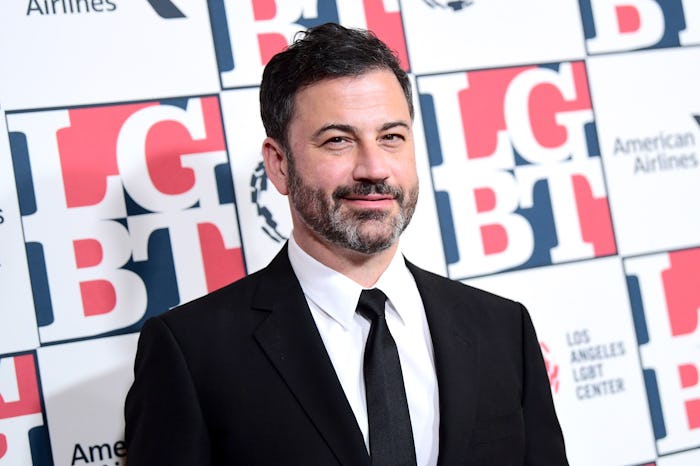Entertainment

The Reason Jimmy Kimmel Regrets Publicly Sharing His Son’s Heart Condition Is So Heartbreaking
In May 2017, Jimmy Kimmel publicly revealed that that his son, William 'Billy' Kimmel, was born with congenital heart disease. The condition, which Kimmel described in an emotional monologue on his show, will require Billy to undergo multiple open heart surgeries in the future, according to HuffPost. Kimmel's moving monologue about Billy's scary condition prompted an important debate about health care in America, and Kimmel has received a lot of praise for his brave decision to publicize such a sensitive subject in order to help others. Despite all the positive responses and feedback, however, Jimmy Kimmel said he regrets publicly sharing his son's heart condition, and many parents of kids with chronic illness will totally understand why.
In an interview with The New York Times on Sunday, Kimmel opened up about what life has been like since sharing Billy's condition with the world. It turns out Kimmel feels conflicted by his decision, and the reason makes complete sense.
Kimmel explained, according to ET Online:
What I didn’t think through was that, everywhere I went, every day of my life, people would be asking me how my son is doing. But thank God I can say he’s doing well. If that wasn’t the case, each day would be very, very painful.
Kimmel's honesty here is not only refreshingly honest, but it also calls for a teachable moment. For parents of children with chronic illness, it can be emotionally draining and triggering to be reminded of their child's illness on a consistent basis, even if their child is doing OK. That's not to say friends and loved ones shouldn't express concern or support — it's just best to be as tactful and considerate as possible when making an inquiry or offering support. An especially good idea is to ask your friend or loved one how they'd like you to approach them about the situation rather than guessing and wondering. Upfront and consistent communication is key here — a person's needs are often ever-changing, and you don't want to waste time or accidentally put someone in a painful place by guessing as to what those needs may be. Remember that it's OK to ask if you're unsure.
Another important thing to keep in mind is that parents of children with chronic illnesses don't just want pity or understanding. Erica Cahill, a parent of a child with chronic illness, explained, according to Parenting:
We don't want sympathy ... but we are grateful for all the acts of kindness from family, friends, teachers and the community.
Whether it be picking up missed homework or just checking in, acts of kindness can go a long way. The best part is acts of kindness don't require parents to elaborate on their child's condition or relive painful moments. An act of kindness can say what needs to be said without explicitly saying it.
Of course, there are parents who do want to have those hard conversations and long talks. In this case, make a point to ask your friend or loved one how often they'd like to discuss their child's chronic illness, and to what degree. Furthermore, it's ideal to just let parents of children with chronic illness feel what they're feeling. In addition to stress and other issues, "some parents, either consciously or subconsciously, come to the belief that other people hold them responsible for their child’s illness," according to the National Autism Association. Even if you don't agree with a parent's perception of the situation, let them take ownership of their feelings — it's no one's place to tell a parent of a child with chronic illness how to feel or behave.
Luckily for Kimmel, it sounds like his fans are being as respectable as possible. Kimmel said of the support he has received since the announcement, according to Yahoo:
People were so nice and people are still nice. They come up to me and ask me how Billy is and, you know, it's really nice to get that from people. I think it's the result of just being on television for so many years. You feel like you know somebody and people say they're praying. It means a lot.
It goes without saying that it can be tough to be a parent of a child with chronic illness, especially if you don't always want to talk about it. Kimmel's honesty about feeling regret over publicly sharing Billy's condition is an important reminder to be as considerate and thoughtful as possible when supporting a parent of a child with chronic illness.
Watch Romper's new video series, Romper's Doula Diaries:
Check out the entire Romper's Doula Diaries series and other videos on Facebook and the Bustle app across Apple TV, Roku, and Amazon Fire TV.